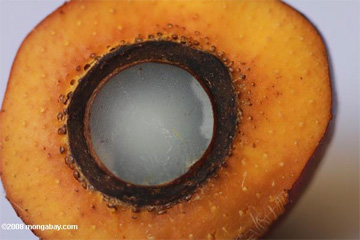McDonald’s Corp. has officially joined the Roundtable on Sustainable Palm Oil (RSPO), a body that sets criteria for improving the social and environmental performance of palm oil production.
The move bolsters the RSPO, which has recently been joined by other major companies, including Walmart, The Hershey Company, and Citigroup, and has seen uptake of its certified sustainable palm oil (CSPO) increase.
McDonald’s membership comes under its Sustainable Land Management Commitment (SLMC) announced earlier this year. The initiative aims to reduce the environmental impact of commodities McDonald’s uses in its food products. SLMC is starting with beef, poulty, coffee, palm oil, and fiber for packaging.
“Participating in multi-stakeholder engagements such as the RSPO is one way for us to put the power and leadership of McDonald’s behind commitments to continue to source sustainable ingredients such as palm oil,” said Francesca DeBiase, McDonald’s vice president, Worldwide Strategic Sourcing, in a statement. “Sustainability issues as they relate to food are often confusing to consumers, and we can help lead the way by educating our customers on how our food is sourced.”
 While palm oil is a highly productive crop, yielding more oil per unit of area than any other oilseed, it has been targeted by environmentalists because its production has at times taken a heavy toll on wildlife-rich rainforests and carbon-dense peat swamps in Indonesia and Malaysia. The RSPO is the palm oil industry’s response to these concerns. |
McDonald’s says it primarily uses palm oil as a cooking oil for its operations in Asia-Pacific, Middle East and Africa, and Latin America.
RSPO welcomed the approval of McDonald’s membership.
“We are extremely pleased that McDonald’s is making significant headway in showing its commitment toward the sustainable sourcing of its food ingredients,” said Darrel Webber, RSPO Secretary General. “The fact that one of the world’s largest consumer brands commits to the growth and use of sustainable palm oil is an important reflection of the increasing demand for sustainable palm oil in consumer markets.”
The RSPO has been shipping palm oil to Europe since 2008. The first shipment arrived in the U.S. last year. Since shipments are still limited, many companies in the U.S. rely on buying GreenPalm certificates, which represent physical palm oil certified under the RSPO and allow companies to financially support “sustainable” palm oil even if their actual sources are not sustainably certified.
Supporters of the RSPO see the certification scheme as a means to create financial incentives for greener palm oil production. However some environmentalists remain skeptical that criteria are strong enough to avoid abuses by members.
In the past 18 months, the RSPO has taken action against a handful of non-compliant members, including Indonesia’s largest palm oil producer, PT SMART, which is owned by Golden Agri Reoucres (GAR). GAR has since announced a comprehensive forest policy that prohibits conversion of land with more than 35 tons of carbon per hectare and requires free, prior informed consent (FPIC) in interacting with local communities.
The RSPO holds annual meetings to examine certification criteria and other issues relating to palm oil production. The next meeting will be held in Malaysia from November 22 – 24.
Related articles
Europe should lift duty on RSPO-certified palm oil to encourage use, says Dutch group
(09/21/2011) To encourage uptake of palm oil that is less damaging to the environment, the European Union (EU) should lift the import duty on palm oil certified under Roundtable on Sustainable Palm Oil (RSPO), said a Dutch industry group.
Alleged moratorium breach becomes test for RSPO
(06/24/2011) An alleged breach of Indonesia’s new moratorium on primary forest and peatlands conversion may prove a test for the Roundtable on Sustainable Palm Oil (RSPO), an eco-certification initiative.

(03/11/2011) McDonald’s announced a far-reaching sourcing policy that could significantly reduce the fast-food giant’s impact on the environment, including global forests. Yesterday McDonald’s unveiled its Sustainable Land Management Commitment, a policy that requires its suppliers to use ‘agricultural raw materials for the company’s food and packaging that originate from sustainably-managed land’.
Breakthrough? Controversial palm oil company signs rainforest pact

(02/09/2011) One of the world’s highest profile and most controversial palm oil companies, Golden Agri-Resources Limited (GAR), has signed an agreement committing it to protect tropical forests and peatlands in Indonesia. The deal—signed with The Forest Trust, an environmental group that works with companies to improve their supply chains—could have significant ramifications for how palm oil is produced in the country, which is the world’s largest producer of palm oil.
Greening the world with palm oil?

(01/26/2011) The commercial shows a typical office setting. A worker sits drearily at a desk, shredding papers and watching minutes tick by on the clock. When his break comes, he takes out a Nestle KitKat bar. As he tears into the package, the viewer, but not the office worker, notices something is amiss—what should be chocolate has been replaced by the dark hairy finger of an orangutan. With the jarring crunch of teeth breaking through bone, the worker bites into the “bar.” Drops of blood fall on the keyboard and run down his face. His officemates stare, horrified. The advertisement cuts to a solitary tree standing amid a deforested landscape. A chainsaw whines. The message: Palm oil—an ingredient in many Nestle products—is killing orangutans by destroying their habitat, the rainforests of Borneo and Sumatra.
U.S. companies should help drive push toward sustainable palm oil
(11/09/2010) U.S. companies should take a leadership role in helping ensure that palm oil production is sustainable and does not come at the cost of forests, climate, and communities, argues a new report published ahead of the annual meeting of the Roundtable on Sustainable Palm Oil (RSPO). The report, published by the National Wildlife Federation (NWF), says that while the U.S. is only a minor consumer of palm oil, its demand for the vegetable oil is fast rising, increasing four-fold since 2006. Palm oil, which is among the cheapest of vegetables owing to its high yield, is now found in up to 50 percent of packaged retail food products.
Dutch to use only certified palm oil by 2015
(11/04/2010) The Netherlands has committed to only using palm oil certified under the Roundtable on Sustainable Palm Oil (RSPO) by 2015, providing a huge boost for the certification standard which aims to improve the social and environmental performance of the world’s most productive oil crop. The pledge makes the Netherlands the first country to commit itself to using only sustainable palm oil.
Nestle’s palm oil debacle highlights current limitations of certification scheme
(03/26/2010) Last week Nestle, the world’s largest food processor, was caught in a firestorm when it attempted to censor a Greenpeace campaign that targeted its use of palm oil sourced from a supplier accused of environmentally-damaging practices. The incident brought the increasingly raucous debate over palm oil into the spotlight and renewed questions over an industry-backed certification scheme that aims to improve the crop’s environmental performance.
Consumers should help pay the bill for ‘greener’ palm oil

(01/12/2010) Palm oil is one of the world’s most traded and versatile agricultural commodities. It can be used as edible vegetable oil, industrial lubricant, raw material in cosmetic and skincare products and feedstock for biofuel production. Growing global demand for palm oil and the ensuing cropland expansion has been blamed for a wide range of environmental ills, including tropical deforestation, peatland degradation, biodiversity loss and CO2 emissions. In response to these concerns, a group of stakeholders—including activists, investors, producers and retailers—formed the Roundtable on Sustainable Palm Oil (RSPO) to develop a certification scheme for palm oil produced through environmentally- and socially-responsible ways. It is widely anticipated that the creation of a premium market for RSPO-certified sustainable palm oil (CSPO) would incentivize palm oil producers to improve their management practices.







